Not to be confused with YesCymru.
Yes for Wales! (Welsh: Ie dros Gymru) is the name used to refer to two separate cross-party pro-devolution groups that were formed in the lead up to the 1997 and the 2011 devolution referendums held in Wales.
| This article is part of a series within UK politics on the |
| Politics of Wales |
|---|
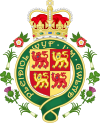 |
| Category · |
Yes for Wales! (Welsh: Ie dros Gymru) is the name used to refer to two separate cross-party pro-devolution groups that were formed in the lead up to the 1997 and the 2011 devolution referendums held in Wales.

Yes for Wales was also name of the cross-party pro-devolution group launched on 10 February 1997 to co-ordinate the campaign for a 'Yes' vote in the 1997 Welsh devolution referendum to create a National Assembly for Wales. It was supported by the Welsh Labour Party, Welsh Liberal Democrats and Plaid Cymru. During the 1997 campaign, the Welsh Conservatives were opposed to the call for devolution.
The Yes for Wales organisation placed a great emphasis on grassroots involvement in the campaign and established local branches throughout Wales. It also managed the difficult job of pulling together campaigners and politicians with very different perspectives who previously fought each other tooth and nail.
The pro-devolution campaign was fought against some fierce opposition from both the Conservative Party and elements within the Labour Party. Although the Assembly has gained increasing acceptance in both parties, these tensions still exist.
The Yes for Wales! Campaign was chaired by Kevin Morgan, a Cardiff University Professor. The campaign's national organiser was Daran Hill. [1]
During the campaign for a Welsh Assembly, Princess Diana died in a car accident in Paris, France. The campaign had been temporarily suspended, and it was wondered what effect the death of the Princess of Wales would have on the referendum. Many commentators were concerned that the death of the princess and focus on the Royal Family would distract from the devolution debate and affect voter turnout. [2]
The 2011 group was launched on 4 January 2011 [3] and co-ordinated the successful campaign for a 'Yes' vote in the 2011 Welsh devolution referendum to extend the law-making powers of the National Assembly for Wales.
The group was chaired by Roger Lewis, the group chief executive of the Welsh Rugby Union., [4] on the recommendation of the First Minister and Deputy First Minister for Wales - Carwyn Jones and Ieuan Wyn Jones. Lewis was not a member of any political party but having returned to Wales from a series of senior jobs in the music industry brought private sector credibility as well as a reputation for being passionate about Wales.
The campaign was supported by both parties of the One Wales coalition government in the Assembly: Wales Labour Party and Plaid Cymru, as well as the Liberal Democrats and the Wales Green Party. [5] Although the Welsh Conservative Party were officially neutral, all the Conservative AMs in the Assembly supported a Yes vote and the party group was represented on the Yes for Wales Steering Committee. The campaign also had the support of the other Permitted Participants recognised by the Electoral Commission: Cymru Yfory, Wales TUC and Unison.
The Yes campaign was overseen by a steering committee chaired by Leighton Andrews, the Labour AM for the Rhondda and Welsh Education Minister. On a day-to-day basis it was organised by a small team of volunteers led by Campaign Director Daran Hill, former Labour Special Adviser Cathy Owens, and ex-ITV Wales Political Editor Lee Waters.
The campaign set up more than 30 local groups across Wales and, within a two-month period from January - March 2011, succeeded in printing and distributing 1.5 million leaflets.
Plaid Cymru is a centre-left to left-wing, Welsh nationalist political party in Wales, committed to Welsh independence from the United Kingdom.
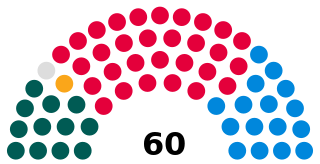
The Senedd, officially known as the Welsh Parliament in English and Senedd Cymru in Welsh, is the devolved, unicameral legislature of Wales. A democratically elected body, it makes laws for Wales, agrees certain taxes and scrutinises the Welsh Government. It is a bilingual institution, with both Welsh and English being the official languages of its business. From its creation in May 1999 until May 2020, the Senedd was known as the National Assembly for Wales.

Ronald Davies is a Welsh politician, former Secretary of State for Wales, former Member of Parliament and former member of the Welsh Assembly. He describes himself as a politician belonging to the "traditional left" who had "spent his life looking for a socialist progressive party". He was a member of the Labour Party, and then of Forward Wales (2004-2009); he was subsequently an independent MP and eventually joined Plaid Cymru in 2010.
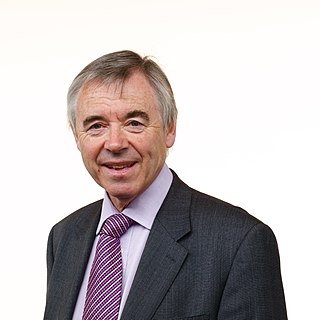
Ieuan Wyn Jones is a Welsh politician who was the Deputy First Minister in the Welsh Government from 2007 to 2011. He was the Member of the Senedd for the Ynys Môn constituency from 1999 to 2013, and he was also leader of Plaid Cymru from 2000 to 2012. Jones served as Member of Parliament for Ynys Môn constituency from 1987 to 2001, when he retired to focus on his work in the Welsh Assembly. In 2007, Jones was named Wales' "Politician of the Year" by the BBC Wales am.pm programme. He resigned from the Welsh Assembly on 20 June 2013. In 2017 he unsuccessfully sought to return to the House of Commons for his former constituency.
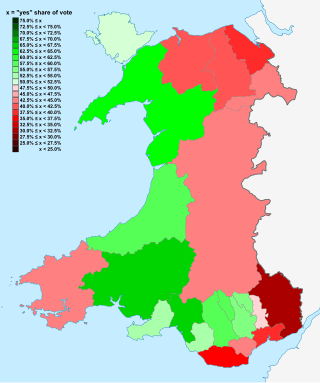
The Welsh devolution referendum of 1997 was a pre-legislative referendum held in Wales on 18 September 1997 over whether there was support for the creation of a National Assembly for Wales, and therefore a degree of self-government. The referendum was a Labour manifesto commitment and was held in their first term after the 1997 election under the provisions of the Referendums Act 1997. This was the second referendum held in Wales over the question of devolution: the first referendum was held in 1979 and was defeated by a large majority.
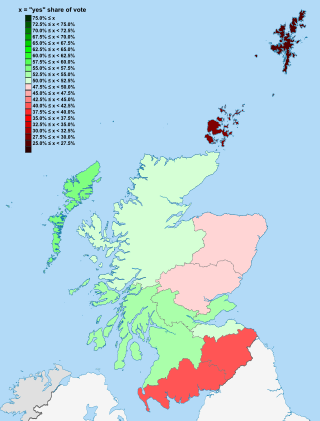
A post-legislative referendum was held in Scotland in 1979 to decide whether there was a sufficient support for a Scottish Assembly proposed in the Scotland Act 1978 among the Scottish electorate. This was an act to create a devolved deliberative assembly for Scotland. A majority (51.6%) of voters supported the proposal, but an amendment to the Act stipulated that it would be repealed if less than 40% of the total electorate voted in favour. As there was a turnout of 64% the "Yes" vote represented only 32.9% of the registered electorate, and the act was subsequently repealed.

Welsh nationalism emphasises and celebrates the distinctiveness of Welsh culture and Wales as a nation or country. Welsh nationalism may also include calls for further autonomy or self determination which includes Welsh devolution, meaning increased powers for the Senedd, or full Welsh independence.

Politics in Wales forms a distinctive polity in the wider politics of the United Kingdom, with Wales as one of the four constituent countries of the United Kingdom (UK).

The 1979 Welsh devolution referendum was a post-legislative referendum held on 1 March 1979 to decide whether there was sufficient support for a Welsh Assembly among the Welsh electorate. The referendum was held under the terms of the Wales Act 1978 drawn up to implement proposals made by the Kilbrandon Report published in 1973.
Gwynoro Glyndwr Jones is a Welsh politician who served as a Labour Member of Parliament. He was a schools inspector for 18 years; he has also been a broadcaster, political commentator and journalist. As a politician, he is best remembered for his long struggle to hold the mainly Welsh-speaking constituency of Carmarthen for the Labour Party against Plaid Cymru leader Gwynfor Evans, about which he wrote a book in the Welsh language.
Welsh Labour is the branch of the United Kingdom Labour Party in Wales and the largest party in modern Welsh politics. Welsh Labour and its forebears won a plurality of the Welsh vote at every UK general election since 1922, Senedd election since 1999, and European Parliament election in 1979–2004 and 2014. Welsh Labour holds 22 of the 40 Welsh seats in the UK Parliament, 30 of the 60 seats in the Welsh Senedd and 576 of the 1,264 councillors in principal local authorities, including overall control of 10 of the 22 principal local authorities.

Leighton Andrews is an academic and former Welsh Labour politician. He was the National Assembly for Wales member for Rhondda from 2003 until 2016. He was Minister for Children, Education & Lifelong Learning from 2009 to 2011, then Minister for Education and Skills in the Welsh Government until his resignation on 25 June 2013 after an alleged conflict between his own departmental policy and his active campaigning to save a school in his constituency. In September 2014 he returned to the government as Minister for Public Services.

Welsh independence is the political movement advocating for Wales to become a sovereign state, independent from the United Kingdom.

The referendum on the law-making powers of the National Assembly for Wales was a non-binding referendum held in Wales on 3 March 2011 on whether the National Assembly for Wales should have full law-making powers in the twenty subject areas where it has jurisdiction. The referendum asked the question: ‘Do you want the Assembly now to be able to make laws on all matters in the 20 subject areas it has powers for?’

Plaid Cymru; The Party of Wales originated in 1925 after a meeting held at that year's National Eisteddfod in Pwllheli, Caernarfonshire. Representatives from two Welsh nationalist groups founded the previous year, Byddin Ymreolwyr Cymru and Y Mudiad Cymreig, agreed to meet and discuss the need for a "Welsh party". The party was founded as Plaid Genedlaethol Cymru, the National Party of Wales, and attracted members from the left, right and centre of the political spectrum, including both monarchists and republicans. Its principal aims include the promotion of the Welsh language and the political independence of the Welsh nation.

The 2007 National Assembly for Wales election was held on Thursday 3 May 2007 to elect members to the National Assembly for Wales. It was the third general election. On the same day local elections in England and Scotland, as well as the Scottish Parliament election took place. This election was preceded by the previous Assembly election in 2003.

In the United Kingdom, devolution is the Parliament of the United Kingdom's statutory granting of a greater level of self-government to the Scottish Parliament, the Senedd, the Northern Ireland Assembly and the London Assembly and to their associated executive bodies the Scottish Government, the Welsh Government, the Northern Ireland Executive and in England, the Greater London Authority and combined authorities.

Unionism in Wales is the political view that supports a political union between Wales and the other countries of the United Kingdom. As well as the current state of the UK, unionism may also include support for Federalism in the United Kingdom and a United Kingdom Confederation.

Welsh devolution is the transfer of legislative power for self-governance to Wales by the Government of the United Kingdom. Wales was conquered by England during the 13th century; the 1284 Statute of Rhuddlan caused Wales to lose its de facto independence and formed the constitutional basis for it as a principality in the "Realm of England". The Laws in Wales Acts 1535 and 1542 applied English law to Wales and united the Principality and the Marches which effectively ended both and incorporated Wales into England. The Wales and Berwick Act 1746 defined "England" to include Wales until the Welsh Language Act 1967, which separated Wales from England within the sovereign state of the United Kingdom.